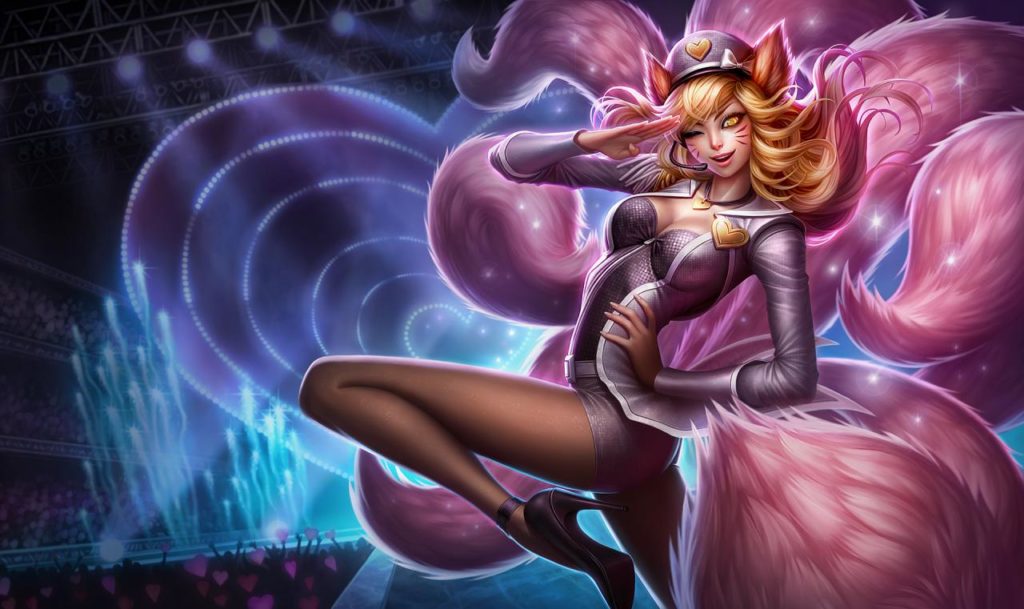K/DA, one of League of Legends’ virtual bands, skyrocketed into stardom after launching its first song in Nov. 2018. Riot Games developers talked about the birth of the group, exploring new directions, and K/DA’s future in the Riot Games music universe in an interview with IGN today.
Toa Dunn, head of Riot Games Music, told IGN that music is a way for the team to express themselves, and they want to lead with it instead of being a complement. At the time, they looked to create a “music universe,” he said, with alternate versions of the League characters going on to become musicians instead of fighters.
Riot began its music adventure in 2014 with an album for its League of Legends virtual band, Pentakill. Its first album, Smite and Ignite, topped multiple charts and became an instant hit. For that year’s World Championship, they collaborated for the first official song with Imagine Dragons. Since then, every year’s Worlds has had an official song—and all of them were instant hits for League fans.
Riot started looking for new territory after the success of Pentakill, and the wildly popular K-pop was on top of the team’s minds.
“When we first started, we were trying to figure out what was a K/DA sound,” Patrick Morales, principal creative director at Riot Games Music, said in the interview. “When we sat down with our composer, Sebastian [Najand], I think the thing that we were all really attracted to was the idea that if we had to really describe a pop sound that we were going for, it would come down to two words: hard-hitting and fun.”
When thinking about the band members, Riot looked to a cosmetic from a couple of years earlier: Ahri’s Popstar skin. The team made her the leader of the music group and looked to build a lineup around the champion. Soon, they settled on Akali, Evelynn, and Kai’Sa as the other group members and founded K/DA.

The group’s debut track was Pop/Stars, an instant hit known for its energetic music and fierce verses. Even though none of their writers had experience working in the K-pop industry, the music seemed to work. “K-pop includes a lot of different forms of music. There are a lot of different genres that are mashed in,” Hye Jin Lee, Clinical Assistant Professor of Communication at the University of Southern California, told IGN. “There’s hip-hop, R&B, rap, house, EDM. You name it, you’ll find it in K-pop. Music-wise, anything can be K-pop, it’s just how it’s delivered.”
“We definitely wanted the fusion,” Najand said in the interview. “Because a lot of K-pop bands also have a rapping section, they have a singing section and all that. So, we definitely wanted to do that. We also wanted to have a multilingual approach, Korean and English in this case.”
After agreeing on the characters and general idea behind the group, Riot looked for artists to perform the voices of the alternative versions of League characters and landed on Soyeon and Miyeon for the Korean vocals and Madison Beer and Jaira Burns for the English ones. Following this success, Riot worked on bulking up its music universe, with more in stock.
“Our team is really starting to focus on what is the future of our music universe,” Dunn said. “Whether it’s Pentakill, whether it’s True Damage, K/DA, DJ Sona. We have a lot of these compelling bands or artists in these different genres. There’s that storytelling element to it, too. Do they collide? Do they come together like you saw with Seraphine and K/DA? It becomes a really interesting platform to tell a story.”
Riot also noted that it will continue to look at opportunities for music around VALORANT, its latest hit in the FPS genre.
Since its debut, K/DA songs have accumulated over 650 million views on Riot’s YouTube channel. On Spotify, the group has 2,6 million monthly listeners with over 530 million streams. It’s hardly the only group that grew into the hearts of the community, however. Pentakill also has a wide fanbase, and Riot teased the band’s return earlier this month.


